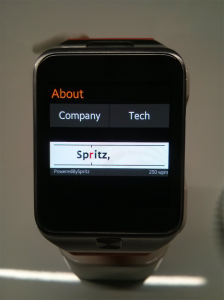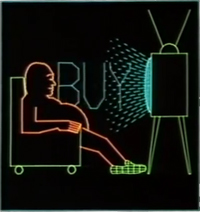Technology makes almost anything we do subject to reinvention, and a company called Spritz is demonstrating this by reinventing something we’ve done the same way for centuries – how we read.  In short, Spritz posits that our eye movement dramatically slows down the speed at which we read. Spritz research suggests that approximately 20% of our time reading is spent processing the content, while the other 80% of that time is spent moving our eyes from word to word. Their technology removes the hefty tax incurred through eye movement by streaming words to the screen in a way that makes typical eye movement unnecessary. Examples on their website had me reading 500 words per minute very comfortably.
In short, Spritz posits that our eye movement dramatically slows down the speed at which we read. Spritz research suggests that approximately 20% of our time reading is spent processing the content, while the other 80% of that time is spent moving our eyes from word to word. Their technology removes the hefty tax incurred through eye movement by streaming words to the screen in a way that makes typical eye movement unnecessary. Examples on their website had me reading 500 words per minute very comfortably.
More and more, our reading is done on screens, not on paper. Spritz’s approach is reading designed from the ground up for the age we live in, and the Spritz technology reminds us that there is still ample opportunity to improve our efficiencies in many areas we take for granted. Moreover, this approach helps overcome new problems that are just now emerging, like how to present information in an age of wearable technologies, where  screen real estate is extremely limited. Streaming words to your phone, watch, or eyewear may prove to be a very efficient way to present information in mobile scenarios. It may even be a more comfortable way to deliver captions for online video – since it can feel awkward reading long strings or multiple rows of text within video experiences today.
screen real estate is extremely limited. Streaming words to your phone, watch, or eyewear may prove to be a very efficient way to present information in mobile scenarios. It may even be a more comfortable way to deliver captions for online video – since it can feel awkward reading long strings or multiple rows of text within video experiences today.
Finally, What impact might this have for traditional advertising and marketing efforts? Mobile environments are already an awful place for delivering typical web display banners, but nevertheless, display ads are dependent on the meandering eye of the end user. They are designed to distract, and exploit the viewer’s drifting attention and wandering eyes, thereby being dependent on the very behavior that Spritz intends to eliminate. On the other hand, it creates yet another opportunity to  reinvent how we accomplish our marketing goals from the ground up. I can’t help but think this brings us one step closer to Blipverts, first coined in the eighties television show, Max Headroom, where 30 second television commercials are compressed into 3 second streams of sounds and images. In the series, Blipverts had a side effect of causing some viewers to explode… but I have a much more positive outlook for Spritz’s implementation.
reinvent how we accomplish our marketing goals from the ground up. I can’t help but think this brings us one step closer to Blipverts, first coined in the eighties television show, Max Headroom, where 30 second television commercials are compressed into 3 second streams of sounds and images. In the series, Blipverts had a side effect of causing some viewers to explode… but I have a much more positive outlook for Spritz’s implementation.
